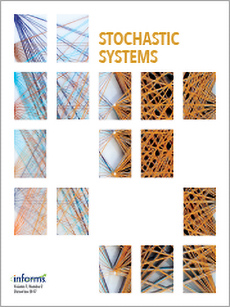Abstract
A supermarket game is considered with $N$ FCFS queues with unit exponential service rate and global Poisson arrival rate $N\lambda$. Upon arrival each customer chooses a number of queues to be sampled uniformly at random and joins the least loaded sampled queue. Customers are assumed to have cost for both waiting and sampling, and they want to minimize their own expected total cost.
We study the supermarket game in a mean field model that corresponds to the limit as $N$ converges to infinity in the sense that (i) for a fixed symmetric customer strategy, the joint equilibrium distribution of any fixed number of queues converges as $N\to \infty$ to a product distribution determined by the mean field model and (ii) a Nash equilibrium for the mean field model is an $\epsilon$-Nash equilibrium for the finite $N$ model with $N$ sufficiently large. It is shown that there always exists a Nash equilibrium for $\lambda <1$ and the Nash equilibrium is unique with homogeneous waiting cost for $\lambda \le1/\sqrt{2}$. Furthermore, we find that the action of sampling more queues by some customers has a positive externality on the other customers in the mean field model, but can have a negative externality for finite $N$.
Citation
Jiaming Xu. Bruce Hajek. "The supermarket game." Stoch. Syst. 3 (2) 405 - 441, 2013. https://doi.org/10.1214/12-SSY093
Information





